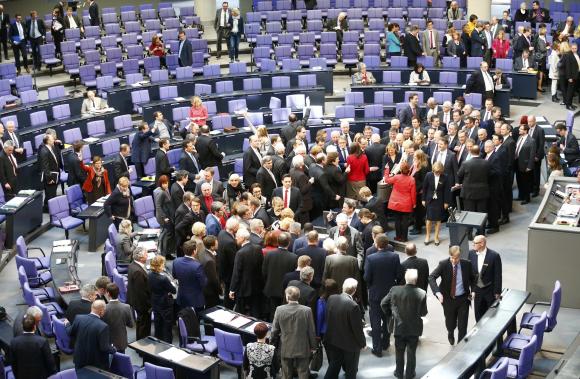German lawmakers have voted to extend Greece bailout by another four months.
The bailout extension – approved by international creditors last week in exchange for a series of Greek government reforms – needs to be ratified by eurozone members.
Some German lawmakers had expressed doubts about the deal and there is substantial public skepticism but the vote passed easily.
It comes after police and protesters clashed during anti-government demonstrations in Athens on February 26.
They were the first such disturbances since Greece’s leftist Syriza was sworn in as the main government party exactly a month ago, promising to renegotiate the country’s debt and end austerity.
Dozens of activists hurled petrol bombs and stones at police and set cars alight after a march involving hundreds of protesters. Some carried banners calling for Greece to leave the EU and for its debt to be cancelled.
Eurozone finance ministers on February 24 approved a set of reform proposals submitted by Greece.

As the dominant economic power in the EU, Germany’s approval was regarded as crucial – and on February 27 the overwhelming majority of lawmakers granted it. A total of 542 voted for the proposals, with 32 voting against and 13 abstentions.
The vote was preceded by a ferocious debate, with catcalling and jeering.
German Finance Minister Wolfgang Schaeuble spoke in favor of the deal, telling parliament: “We Germans should do everything possible to keep Europe together as much as we can.
“We’re not talking about new billions for Greece… rather it’s about providing or granting extra time to successfully end this program.”
There has been a chorus of skepticism about the deal inside Germany – with Thursday’s edition of the largest tabloid, Bild, emblazoned with the word “No!”, adding “No more billions for the greedy Greeks!”
Hawkish elements within Chancellor Angela Merkel’s CDU (Christian Democratic Union) and its Bavarian sister party, the CSU (Christian Social Union), have portrayed the extension deal as leniency for Greece.
Wolfgang Schaeuble himself has expressed doubt about the Greek government’s commitment to reform.
However, German legislators felt they had no choice but to pass the vote, as a eurozone breakup could prove even more expensive than the bailouts and potentially undermine the credibility of the euro.
In Greece, the proposed bailout extension has also triggered dissent within the governing party.
Greek PM Alexis Tsipras has defended it, but some on the hard left have accused Syriza of going back on pre-election pledges.
Even if the bailout extension goes through Greece still faces the formidable task of trying to service its debt obligations.
Greece will need to flesh out its reform program in detail by April and prove that reforms are bedding in before receiving a final disbursement of 7.2 billion euros.
In the meantime Greece has to repay several billion euros in maturing debts, including about 2 billion euros to the IMF in March, and 6.7 bilion in European Central Bank bonds maturing in July and August.
[youtube j9d8TztoCkI 650]
